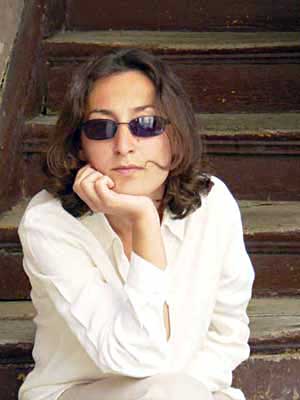about the production
If slightly exaggerated the unfinished play by German dramatist Georg Büchner could be compared to Rohrschach´s text. In the author’s legacy one unfinished torso of a play with unnumbered pages and statements was found. Even though there is a fixed order of scenes, they can be treated freely and ordered according individual key. In spite of fragmentariness of the material (or thanks to it), a tragic story emerges from it about two young lovers – Woyzcek and Maria.
Their relationship is far away from the one of Romeo and Juliet (or Othello and Desdemona). The tragedy of this couple is considered banal, and because of this, it is more tragic – Büchner writes about love giving an example of two ancient characters isolated in the shell of their story. His drama has a strong social background – two lovers live and work in places without metaphors, and their story with unhappy end would interest only some tabloid during a summer season. The author left us drama in which Woyzeck´s murder of jealousy is not exactly motivated – it rather protrudes the play as almost some statistic fact.
Many directors, among them provocative young director Maja Kleczewska, think that Woyzeck´s act should be motivated on the stage by psychological uncovering of social background in which the pair lives. In her version of this world there is no metaphysics – every act is defined by satisfying of biological needs and ventilating the pressure of energy of instincts. Love has a form of automatic fixation of one person to another because “this is how it should be”. The love bond is not filled with trust or sacrifice for the other – it is a social, Darwinist need which should be put up with like with the need of working, eating and sleeping.
This is why there comes an impulse after Maria’s infidelity. This is why Woyzeck, in a need for money, does a homosexual prostitute or gives his body to medical experiment. Everything in this world can be numbered and priced, and to every reaction there exists a counter-reaction. Until the moment when an act appears which is non-understandable for society – one of its links is destroyed. Woyzeck´s reaction is exorbitant and therefore illogical and beyond understanding – it does not correspond with the energy given to the action (the infidelity here is not repaid by infidelity or something of its value, but by a murder, and that belongs to a higher price group). There occurred an error, and to have the system in the balance again, the murder has to become a coin of the same value. In this world without metaphysics, which is depicted on the background of the stage with a dominating Don-Juan-like-statue church, the only false consolation against existentialist anxiety is a steady regime of every-day doings, and the biggest scarecrow is an interruption of the rhythm, which could create unexpected “pause” in the future.
Kleczewska brings her female view on this masculine play. Her view on the world directed by male values and subordination is merciless. Hyperbolized scenes make Büchner´s every-day characters titanic heroes. Their fifteen minutes of stardom end in a moment when a new error emerges in the system – a murder or some other catastrophe. And it will certainly come – we may trust the rhythm in this world.
Ján Šimko
“Kleczewska again shows us a world in which our notions of normality and abnormality are overturned. ... The one symbol of lasting values is a Baroque altar barely visible at the back of the stage. However, what is very clear is that no one has prayed before it for a long time as on the floor in front of it stand several inches of water. It is at this altar that Woyzeck kills Maria.”
(Roman Pawlowski)
“Maja Kleczewska believes. She has dug and bored into Büchner’s play, finding in it the story of a ‚sacred’ family who transgress. It tells of the sin which joins two ordinary young people and then annihilates them. Kleczewska confirms that she makes mostly male and, as
far as the expression is concerned, the cruelest theatre from all the directors of her generation.”
(Łukasz Drewniak)
creators
directed by Maja Kleczewska
translation: Piotr Lachman
set design: Katarzyna Borkowska
music: Adam Falkiewicz
lighting: Karina Kleszczewska
characters and cast: Franek Woyzeck: Sebastian Pawlak, Mária: Aleksandra Bożek, Drum Major: Wojciech Masacz, Doctor: Szymon Mystakowski, Andres: Marek Sitarski, Mariola: Izabela Noszczyk, Sweetie Kamila: Sylwia Nowicka, Margret: lzabella Piątkowska, Kathy: Izabela Soroka, Grandmother: Izabela Niewiarowska-Wołoszyńska, Wino: Piotr Bigora, Igor: Arkadiusz Cyran, Blond: Olek Janiszewski, Killer: Remlgiusz Jankowski, Charles: Karol Kręc, Captain: Jacek Jackowicz
director

Maja Kleczewska (1973)
Maja Kleczewska graduated from the Department of Directing of the State Theatre School in Cracow in 2000. Amongst her productions number David Harrower’s Knives and Hens (Julius Słowacki Theatre, Cracow, 2002), Kevin Keyes’ One Flew Over the Cuckoo’s Nest (Jerzy Szaniawski Drama Theatre, Wałbrzych 2002) and William Shakespeare’s Macbeth (Jan Kochanowski Theatre, Opolo, 2004). In 2003, One Flew Over the Cuckoo’s Nest received the Wojciech Statuette and the Actors’ Ensemble Award at the 43rd Kalisz Theatre Festival and in 2005 the production received the Audience Award at the 7th Festival of the Director’s Art – “Interpretations” in Katowice. She was awarded the Konrad Laurel and four out of five juror’s awards for Wojzeck at the 8th edition of “Interpretations” in March, 2006.
Materials available
Script of the production: SK, EN
If you are interested in these materials, write to archivy@nitrafest.sk
